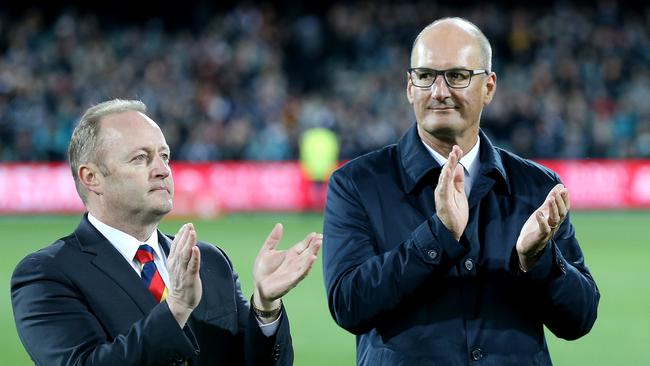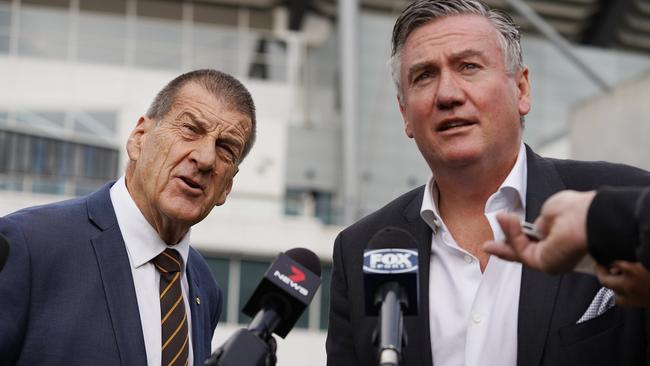If the AFL is to survive this shutdown they must support one another
Australian football faces dramatic changes to overcome the damage presented by the COVID19 crisis. It can only survive with unprecedented unity.
- Port’s 150th anniversary now about survival
- How to get the most out of your Advertiser digital subscription
Saturday night was supposed to be another grand moment in Showdown history at Adelaide Oval – a night of getting one-up on the intown AFL rival.
Instead, Australian football – at every level – and all other sports are at the point where the line has to be drawn on the competitive urge to sink an opponent, even a much-disliked rival.
The old VFL that has become the national AFL was created at the end of 1896 when six clubs broke away from the Victorian Football Association. The rich were tired of carrying their rivals who were weaker either financially or on the field.
The “new” AFL of 2021 – if it is to maintain 18 teams and the vision that was in place before COVID19 changed our lives – will have to be built on unity rather than division.
No-one can be sure what the final cost to Australian sport – let alone the national economy – will be at the end of this crisis that has created more uncertainty than two world wars and an economic depression in the previous century.

As the AFL clubs this week cut their costs by millions and staff by 80 per cent, the final loss at each of the 18 AFL operations is still estimated at $10 million and $500 million for the league as a unit – and this assuming there is still a 17-round season with finals, in particular a grand final to appease the television partners. Very few clubs can expect to be debt-free by the close of their financial year on October 31.
So the game’s history of the rich taking issue in carrying the poor must change. The AFL cannot afford any of its leaders to reincarnate the cutthroat business-world themes of “Diamond” Jo Gutnick, the Melbourne Football Club president from 1996-2001.
The AFL’s long-held “socialist” policies of sharing the wealth – to make the collective league stronger – mean more today than ever before.
AFL chief executive Gillon McLachlan has set the agenda: “We have the will to work collectively to overcome this crisis … to say this is the most serious threat to our game in 100 years is an understatement.
“The only way that footy can find a way through is to continue to be agile, flexible and – most importantly – united.”
Finding unity in Australian football is a key test for men and women who have thrived on scoring points against their rivals on the field – and winning financial power off the park.
But there is hope, particularly when outspoken club leaders such as Hawthorn president and former Victorian Premier Jeff Kennett embraces socialist ideals that are contrary to all he has stood for in the real world.
Called to the AFL’s special cabinet, with three other club presidents, Kennett publicly took issue with anyone seeking to create the divide that split the VFA in 1896 to create a new “super league”, the VFL.

“We are all in this together,” Kennett says. “The last thing we want is having one club, one president disagree with another … I want all clubs kicking in the same direction, all the time. There is no advantage in trying to kick in the opposite direction … we all have to stand together on this.
“How do we come out of this … Together we will get through it. If we break the chain, that is when you put at risk the outcome. And I will not be part of anything that is not the accepted view of the AFL, the commission and the clubs.”
Collingwood president Eddie McGuire is far removed from his predecessors who would take issue with any “Robin Hood” executive from AFL House looking to take money from the rich to offer as “hand outs” to the poor.
There will be much debate on government funding – or loan guarantees – underwriting the future of the 18-team AFL as an “industry” and the Australian football game as a community sport.
There will be need to cut back salaries in a league where club chief executives contract have risen to $900,000 a year; football departments have ballooned amid an “arms war” to seek a competitive advantage; average player salaries have reached $400,000 while annual club revenues are at an average of $65 million.
The AFL players won their battle for a flexible collective bargaining agreement – signed at Adelaide Oval on June 21, 2017 – believing the game would draw more and more money and they wanted their cut. It also carried the risk, then seen as minor, that if there was a fall in AFL revenue, the players would lose cash.
That unexpected moment has arrived. And if the clubs are going to stand together – even the usually combative Kennett – then so must the players.
United the game will rebound. Divided it will fall. This is not 1896.
